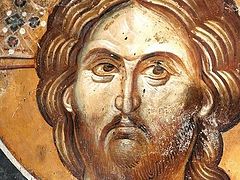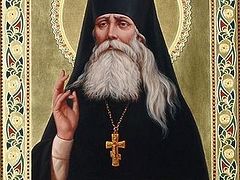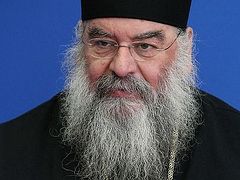The grace of our Lord Jesus Christ and the love of God the Father, and the communion of the Holy Spirit be with you all.
This blessing and grace that we receive and accept is given to those who attend the Divine Liturgy. Therefore, we say you have to go to the Divine Liturgy and participate in it.
People often ask: “Why should I go to Liturgy?” You have to go because you won’t receive all these blessings and this grace if you don’t participate in the Sacrament of the Eucharist.
The grace of our Lord Jesus Christ… What does “grace” mean? It means energy; it’s the uncreated energy of God; it’s an energy similar to electrical energy. For example, who’s seen a current? No one’s seen it, it’s invisible, but if you touch a bare cable, the current will hit you. Electrical energy isn’t like water, which you can see, although you see its result, and you can feel it.
Such is the grace of God. It’s uncreated energy; you can’t see it, but you feel it when you receive this energy from without. It’s like connecting a transistor and it starts working—such is grace. It’s not something abstract, not some kind of feeling, not something subjective, such that a person creates it himself: It doesn’t come from man, but from God and enters into man, activates him, and you know and feel it. Grace is the energy of God, the power of God that activates human souls.
… the love of God the Father… God the Father infinitely loved the world, and you can’t understand Him with your mind; you can neither describe, nor limit, nor express God’s love; it’s inexpressible. But our love is human. We are people and, naturally, limited beings. We say: “I love one person with all my heart.” But whatever we say or do to them, our love will be much less than what we can say and express.
And now think about God. When God loves, Who is boundless by nature—neither the human mind nor angelic minds can grasp Him—then no one can fully comprehend God’s love. This infinite Divine love of the Father, Who so loved the world, that He gave His Only-begotten Son, that He might save the world, that the world might come to Him, and men might become His children, that we might have access to His love and Kingdom.
… and the communion of the Holy Spirit…—that is, that we might partake of the grace of the Holy Spirit, and it might enter into us, and we might unite with it. That we might become like flour, which, having absorbed water, becomes dough. Then, the flour can no longer separate from the dough, such that you could say: “This is flour, and this is water”—because it’s already dough. So when we have communion with the grace of the Holy Spirit, we become one with God, and this blessing of the priest, taken from the Epistle of the Holy Apostle Paul (2 Cor. 13:13), directly transmits to us the blessing of the Holy Trinity.
… be with you all! When the priest says something in the Divine Liturgy or in the Sacraments, it’s not just a prayer that could come true or not. When the priest says something in the Sacraments, through his priesthood, it’s already considered an accomplished event. For example, when he blesses water and it becomes holy water, there’s no chance that it won’t become holy water. When the priest reads a prayer over a man or blesses him, it’s impossible that this blessing could not be a blessing, regardless of who the priest is. He may be the most sinful, accursed, a thief, a liar, a sinner—it doesn’t matter. From the moment he became a canonical priest, and if the Church hasn’t defrocked him, his blessing and Liturgy are equal to the Liturgy that Christ Himself would serve.
That is, if we had a Liturgy served by Christ Himself and a Liturgy served by this priest, which Liturgy which would have greater power? They’re both the same. Because Christ does everything in everyone, and the priest is a minister. Of course, an unworthy priest burns up serving unworthily, because the Holy Mysteries are a flame turning him into ashes. But whether he burns, whether he turns to ashes—that’s his business, and we can’t condemn him or pass sentence on him. There are competent Church organs that can investigate these issues. We’re interested in whether the priest is canonical or not, whether he’s been defrocked or not; and if not, then by virtue of his priesthood he celebrates the Holy Sacraments.
St. John Chrysostom says that in his time, some people venerated good priests. We do it too, just like that, in a human way, that is:
“Such and such a priest has come! Oh, he’s a holy man!”—and everyone rushes off to kiss his hand.
Then another priest comes who, alas, isn’t a saint or whom we haven’t perceived as a saint. They just say to him: “Bless, Father,” if they even say that. That we take a blessing from him is good, but what does it mean? The priesthood isn’t a question of personal holiness. Whether he’s a saint or a sinner—it’s his business. When you honor a holy priest, you honor not the priesthood, but holiness. And when you honor any priest, in the person of the priest you honor the priesthood, and in honoring the priesthood, you honor Christ, Who is the source of the priesthood and the Great High Priest of the Church.
Therefore, one of the prayers of the Divine Liturgy says: “For Thou art He that offereth and is offered, that accepteth and is distributed, O Christ our God.” It’s Christ serving the Liturgy, not the priest. He is the One Who offers the gift, and offers Himself; He is the gift and the Giver of the gift; He accomplishes everything in everyone.
We honor the priesthood; we honor the grace of the Holy Spirit acting through the priest. Therefore, woe be to us if the Church were based on subjective holiness; that is, if it were the case that if the priest is holy then the Liturgy is valid, and if the priest is a sinner then the Liturgy is invalid. That’s not how it is. Thus, when a priest celebrates a Sacrament, all of God’s blessing and grace are transmitted through the priesthood to men.
You’ll say to me: “Why does the blessing of some priests have power, and that of others doesn’t?” It doesn’t depend on the priest; it’s because we don’t accept it with faith, because we’re human and we have our human infirmities. We have more faith when we receive a blessing from a holy priest because we set ourselves up in advance with our faith, saying: “He’s holy, a good man,” and so on. And so, thanks to our faith, we predispose ourselves to him.
We have to go to Liturgy, even if we stand there like stumps. Some will say: “I’m not how I should be. I don’t understand any of it. My mind can’t concentrate there.” But go, no matter what. One elder said: “When you stop into a perfume store, your clothes smell fragrant after you leave, even if you didn’t buy anything.” This is what happens, he says, when you go to Liturgy.
Maybe you won’t be able to do anything spiritual, but even the fact that you went, that you stood there like a stump—that’s already something. So tell yourself: “I’ll go as I am—an unhewn log. After all, God knows how to hone down the unhewn log.” And if you don’t go because you say, “I can’t, I can’t concentrate,” then everything will get worse and worse, and you’ll never get better.




